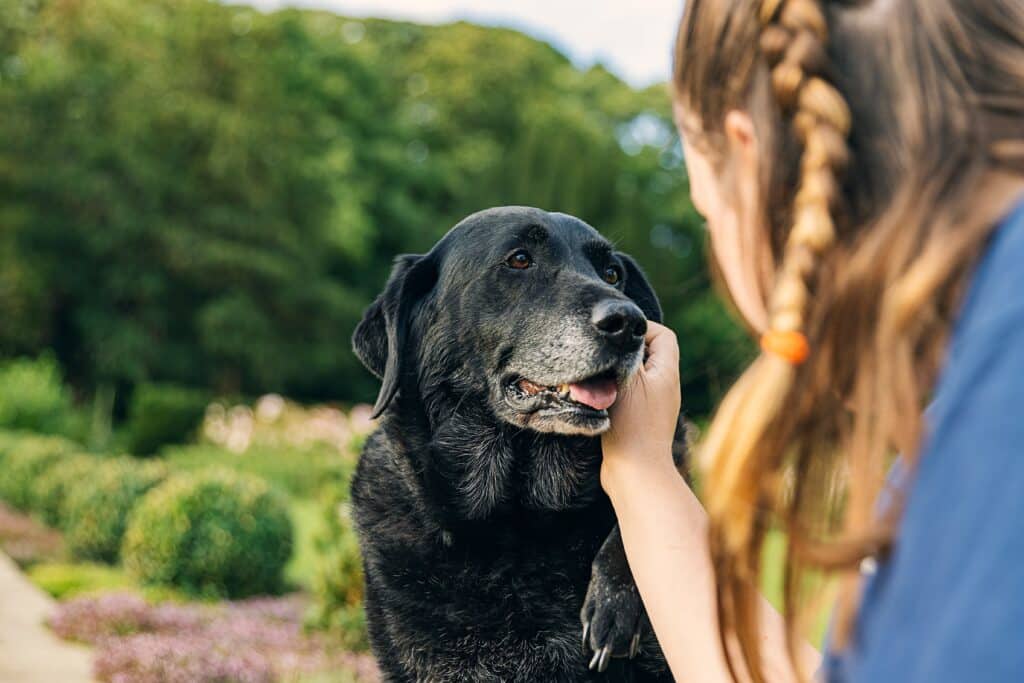What Is Black Dog Syndrome? Here’s Everything You Need To Know Leave a comment
Have you ever heard of Black Dog Syndrome (BDS)? It is seen in the pet adoption world where black dogs are ignored in favor of their light-colored counterparts.
And this February, we aren’t just celebrating the month of love, but we’re also letting black dogs stand out in the spotlight as we celebrate Black Dog Syndrome Awareness month.
Dive right in and find out everything you need to know about this phenomenon — it’s emergence, impact, and how we can help change it!
What Is Black Dog Syndrome?
This negatively affects the adoption rates of black pets, in this case, black-colored dogs. And is something observed by a lot of shelters and rescue groups not only across the country, but all over the world.
Is Black Dog Syndrome Actually Real?
Most scientific researches point out that Black Dog Syndrome is not real. But animal welfare organizations recognize the phenomenon and the data that proves its existence are anecdotal.
For example, this scientific study published in 2023 found that black dogs did not experience longer adoption times nor higher euthanasia rates in shelters.
And then another study conducted in 2013 found that coat color doesn’t influence a dog’s adoption rates. The researchers also noted that Black Dog Syndrome may be more prevalent in certain areas of the world, possibly due to cultural differences.
However, there are also studies such as this 2011 study saying that the appearance of a dog is the most frequently cited reason for potential adopters.
But while researchers surrounding Black Dog Syndrome have conflicting evidence, people involved in animal rescue firmly believe in the phenomenon’s existence.
According to these individuals, rescues and shelters frequently see potential adopters overlooking black-coated dogs, which makes it harder for them to find their forever homes. Sometimes, black dogs can stay in shelters for a year or two before finding an adopter.
Why Are Black Dogs Less Likely To Get Adopted?
There are a lot of reasons that negatively impact a black dog’s adoption rate. From cultural stigma such as bad luck and witchcraft to practical reasons such as being less photogenic and the negative emotions associated with the color black.

Below, we’ll discus these factors for a better understanding of the Black Dog Syndrome.
Mythology
In mythology, black dogs are generally portrayed as menacing or malevolent. The most prominent example, Cerberus, the multi-headed dog of Hades that guards the gates to the underworld, is a black dog. And throughout European mythology, black dogs have been associated with death.
Superstitions
Just like with black cats, people believe that black dogs bring bad luck and are omens of death. As a matter of fact, in some African cultures, black dogs were associated with witchcraft and are seen as supernatural beings.
They are believed to carry the evil spirits of ancestors and are therefore potentially dangerous. Because of these superstitions, there’s also a stigma that black dogs are aggressive.
Pop Culture References
Like mythology, pop culture has depicted black dogs in a negative way. Whether it’s in books, TV, or movies, when a dangerous dog is part of the story, they’re almost always described as a black dog.
Take “Grim” from the “Harry Potter” series as an example. Grim is an omen of death and he is depicted as a big, black dog. Another great example is “The Hound Of The Baskervilles” which is a story focusing on a large, demonic, and black dog.
The Color
The color black is often associated with sadness, fear, anger, and/or guilt. And for most cultures, black is the color of mourning and is also associated with loss and death. Furthermore, there is a term called “Black Dog” which is used to describe feelings of depression.
Facial expressions and physical appearance
Due to their coat color, the facial expressions, features, and personalities of black dogs are often harder to capture in photographs.
So, they are seen as less photogenic and potential adopters that rely on the “first look” of photos often overlook them because adopters can’t seem to find that “connection” with the dogs.
Black Dog Syndrome Awareness Month

While it’s difficult to determine whether Black Dog Syndrome is real or not, animal lovers who have experienced it first-hand agree that it is a common, and unwelcomed phenomenon.
And February is the perfect time to raise awareness on Black Dog Syndrome as we celebrate Black Dog Syndrome Awareness Month.
This is an initiative that aims to raise awareness about the phenomenon, debunk the myths surrounding black dogs, advocate for black dogs, and promote their adoption.
As we raise awareness about this phenomenon, we do not only reduce the negative stereotype surrounding black dogs, but we also help promote equal opportunities for adoption, encourage informed decision-making, and promote inclusivity.
How To Help
Black dogs are no different than dogs of other colors, well, except for their coat color. But that’s just about it! Black dogs act the same, and will love you just the same.
And there’s so many ways to help highlight these amazing characteristics in black dogs and reduce the stigma surrounding them! Here are a few ways to help:
Share posts on social media: If you see adoptable black dogs on social media sites like Facebook, you can help increase their chances of finding a forever home by sharing posts and promotions about them.
Consider adoption: If you’ve been looking to adopt a dog of your own, why not consider adopting a black dog? This might be your sign to get one!
Help a local shelter: If adopting is simply not an option, you may opt to donate to your favorite local rescue so they can continue caring for the dogs in their care.
Utilize the hashtag #BlackDogSyndromeAwareness: If you already have a black dog, share how amazing they are on social media, talk about their plight in animal shelters and rescues, and use the hashtag #BlackDogSyndromeAwareness.
All Dogs Deserve A Fair Chance

This month of February, let’s lend a helping had to black dogs in their plight by helping reduce the stigma surrounding them so that, just like other dogs, they can find their own forever homes.
Do you have a black dog yourself? Share how amazing, fun, and loving they are in the comments below!

